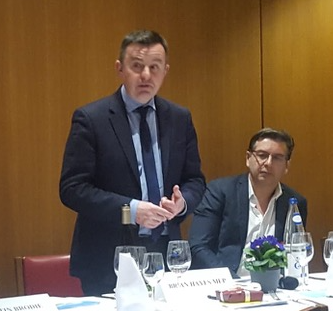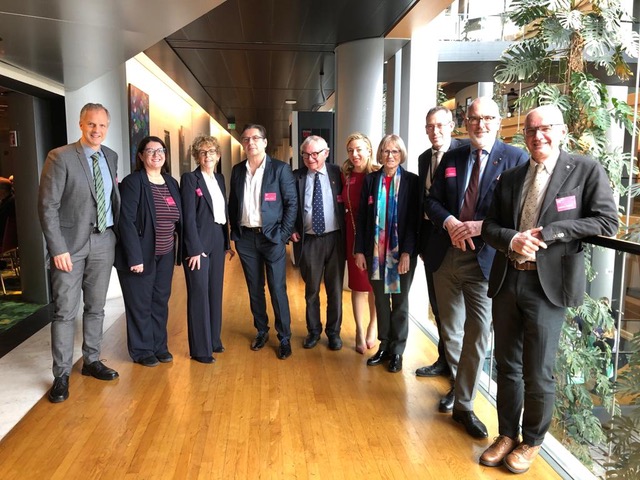International Epilepsy Day event in the European Parliament reports on the unmet needs in the field of epilepsy and the status of epilepsy research priorities at a global level.
The event was organised by Epilepsy Alliance Europe joint task force of IBE and ILAE in Europe and hosted by the European Advocates for Epilepsy MEP group in the parliament.
- prevention of epilepsy;
- prevention of sudden unexpected death in epilepsy (SUDEP);
- optimization of epilepsy surgery;
- worldwide development of mobile health programs to disseminate essential knowledge about epilepsy;
- assembling of a very large well characterized cohort of persons with epilepsy that could be participate in all the above projects and in the development of personalized therapies for seizures, syndromes and related comorbidities.

Brian Hayes MEP, speaking at lunch event
Delegation to the parliament, from left: Jakob Christensen representing ESBACE; Janet Mifsud, Member EAE; Ann Little, IBE Executive Director; Philippe Ryvlin, Co-chair EAE; Martin Brodie, IBE President and Co-chair EAE; Francesca Sofia, Member EAE; Astrid Nehlig, Editor Epilepsia; Fred Destrebecq, EBC; Eugen Trinka, Chair ILAE-Europe and Member EAE; Michele Simonato, representing epiXchange.
“I wish my daughter simply to be happy”Despite the hardships that life has thrown at her, Bea remains a happy loving 9-year old, who goes to school and who yearns to have friends. But the sad situation is that she has never had a friend and has never been invited to a play-date or party by classmates. Any invitation sent by Francesca to her daughters classmates for play dates or parties have always been declined by their parents. A strong indication that there is still huge misconception and stigma attached to a diagnosis of epilepsy. And if the parents are discriminatory towards Bea, this is likely to run off onto their young children.
The Speakers
Brian Hayes MEP
Brian Hayes served as a member of Dail Eireann (Irish Parliament) from 1997-2002 and 2007-2014, until his election to the European Parliament in May 2014. He was appointed to three European Parliament Committees – Economic & Monetary Affairs, Development, and Budgetary Control. He is a member of the Delegations to Iraq and South Africa.
Martin Brodie
Prof Martin Brodie is President of the International Bureau for Epilepsy (IBE) and Co-chair Epilepsy Alliance Europe. His involvement with IBE goes back more than 30 years, having served as a member of its board from 2005 to 2009.
His research interests include antiepileptic drug neuropharmacology, randomised clinical trials, prognostic outcome studies, management of epilepsy and factors affecting antiepileptic drug response.
Francesca Sofia
Dr Sofia is a molecular biologist with a PhD in neuroscience. She specialized in healthcare economics and policy as a research program manager for an Italian health foundation, dedicated to rare genetic diseases.
Her career path changed when her youngest daughter was diagnosed with a rare form of epilepsy, in 2011. In July 2014, she joined the Italian Epilepsy Federation with the aim of fostering epilepsy research. Recently, she founded Science Compass, an enterprise that provides services and tools for effective investments in the biomedical sector to non-profit organizations.
Frederic Destrebecq
Frédéric Destrebecq is Executive Director of the European Brain Council. In this capacity, he is responsible for providing strategic direction and leadership while managing the day-to-day operations of EBC and its ongoing relationships with its member associations and other stakeholders, as well as representing the organisation in various European and national forums.
Prior to this position, Fred served the European Union of Medical Specialists (UEMS) as Chief Executive Officer, and previously as Director for European Affairs.
Philippe Ryvlin
Dr Ryvlin is Professor of Neurology and Chair of the Department of Clinical Neurosciences at University Hospital of Lausanne (CHUV), Switzerland, and Director of the Epilepsy Institute (IDEE) in Lyon, France. He is President of the European Epilepsy Monitoring Association (EEMA), co-Chair of the Epilepsy Alliance Europe Task Force, founder of the European Network for Epilepsy Research (ENER), and coordinator of the EU funded pilot ERN – (E-PILEPSY).
Members of the European Advocates for Epilepsy Group
President: Brian Hayes (Ireland)
Vice President: Nathalie Griesbeck (France)
Members:
Heinz Becker (Austria), Bendt Bendtsen (Denmark), Franc BogoviČ (Slovenia), Michal Boní (Poland), David Borelli (Italy), Paul Brannen (UK), Christian-Silviu Bușoi (Romania), Matt Carthy (Ireland), David Casa (Malta), Nessa Childers (Ireland), Lefteris Christoforou (Cyprus), Kostas Chrysogonos (Greece), Deirdre Clune (Ireland), Miriam Dalli (Malta), Tanja Fajon (Slovenia), José Inácio Faria (Portugal), Eleonora Forenza (Italy), Lampros Fountoulis (Greece),
Jens Gieseke (Germany), Theresa Griffin (UK), Jytte Guteland (Sweden), András Gyürk (Hungary), Marian Harkin (Ireland), Anna Hedh (Sweden), Liisa Jaakonsaari (Finland), Anneli Jäätteenmäki (Finland), Barbara Kappel (Austria), Karin Kadenbach (Austria), Seán Kelly (Ireland), Katerina Konečná, (Czech Republic), Miapetra Kumpula-Natri (Finland), Merja Kyllönen (Finland), Giovanni La Via (Italy), Jean Lambert (UK), Marian-Jean Marinescu (Romania), Costas Mavrides (Cyprus), Mairead McGuinness (Ireland), Roberta Metsola (Malta), Tilly Metz (Luxembourg), Ulrike MŰller (Germany), James Nicholson (UK), Demetris Papadakis (Cyprus), Dimitrios Papadimoulis (Greece), Emilian Pavel (Romania), Alojz Peterle (Slovenia), Sirpa Pietikáinen (Finland), Pavel Poc (Czech Republic, Dominique Riquet (France), Paul Rübig (Austria), Sofia Sakorafa (Greece), Christel Schaldemose (Denmark), Annie Schreijer-Pierik
(Netherlands), Olga Sehnalová (Czech Republic), Igor Šoltes (Slovenia), Maria Spyraki (Greece), Neoklis Sylikiotis (Cyprus), Eleftherios Synadinos (Greece), Claudiu-Ciprian Tânâsescu (Romania), Patrizia Toia (Itlay), Nils Torvalds (Finland), Ivo Vajgl (Slovenia), Julie Ward (UK), Theodoros Zagorakis (Greece), Tomáš Zdechovský, (Czech Republic), Jana Žitňanská (Slovakia).

